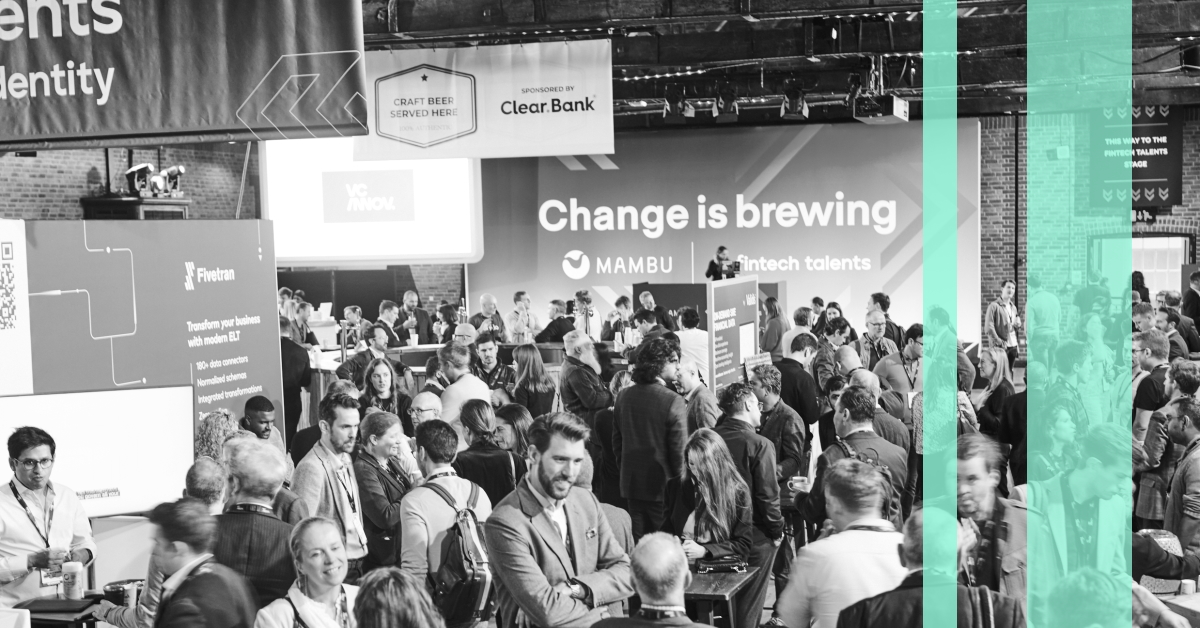Since announcing the Future Identity & Fintech Talents festival, the response to ‘bringing back the stage’ was amazing. And yet, as we did a final run through and prepared to open the doors, there was a hint of nervousness, like meeting up with a friend after a long time apart.
After a busy 18 months of virtual events, how would it feel to be in one space, discussing identity innovation? Would music, craft beer and a busy Expo Floor feel unfamiliar after a long pause?
Of course not, within minutes, like conversations with old friends, the Festival floor was buzzing and in full flow. Everyone we spoke with or passed by, could be heard saying how great it was to be back at a physical event. I heard again and again, that after a year of Zoom (and other available platforms…) nothing beats face to face, in real life, contact.
As much as we celebrated those that could join us at the Brewery in London, those that joined virtually were equally active participants. They sent in questions and had lively conversations throughout the day on the virtual events platform. Speakers were mostly on-stage, but some joined via our virtual events platform.
We managed to bring the two together, the virtual and the physical, in such a way that no one was excluded.
 Future Identity Stage
Future Identity Stage
Laura Camplisson, Product and Content Manager, VC Innovations
As the audience applauded the closing panel at Future Identity 2021, it was hard to believe the brand is less than one year old. We launched the portfolio early in 2021, with a virtual event which stayed true to our fintech roots and focused on identity in finance. Since then, we have welcomed groups and individuals from a range of sectors to our community, and it was a privilege to finally bring this community together face-to-face.
It may sound cliché, but you could genuinely feel the buzz on stage, in the audience and across the exhibition floor. I learnt so much over the two-days from our speakers, as they shared their perspectives on the challenges and opportunities shaping the future identity ecosystem. The impact of the last two years was clear, and yet seems to have created an even deeper determination to deliver better ways to manage identity in the new-normal.
Whether we were talking about identity in healthcare, financial services, travel or a range of other use cases, there were clearly some common themes. The need for meaningful consent and awareness of how our data is used, the importance of choice to ensure accessibility, the ongoing development of trust frameworks to govern identity and an end goal of portable, interoperable identities, were just some commonalities.
There was appreciation of shared barriers and threats, consensus that there is no one-size-fits-all model of identity, but also a fair about of optimism about how digital identity is evolving. Overall, I came away feeling very positive, and with a great deal of insights to take forward. Judging by the positive feedback received from delegates, it seems many people felt the same way.
The best part by far was getting to chat with real-life people, and I’m already looking forward to our next in-person event. We have big plans to expand Future Identity further in 2022, so watch this space! In the meantime check out our Future Identity festival content on-demand.
 Fintech Talents Stage
Fintech Talents Stage
Lisa Moyle, Director of Strategy, VC Innovations
From kicking off with a top-notch panel looking at the State of UK Fintech, through to a closing session looking at How to Build a Fintech Leader, the Fintech Talents Stage speakers brought their A game. Two days of discussions covered a fantastic range of topics. Themes around Embedded Finance, Open Finance, De Fi, ESG, Diversity & Inclusion, Platformication and Digital Identity ran throughout – which was fortuitous given the other Festival stages dived deeper into these topics.
On the back of continued and fast-paced growth in the sector, accelerated by the pandemic, were many fascinating discussions across the two days. Some of the key takeaways for me were that ESG is not CSR, and the pivotal and foundational role the financial services sector plays in rolling out those changes across all sectors of the economy, is action that cannot wait. If you aren’t thinking seriously about how that will change the way you work, and the products and services you deliver, then you will not just miss the boat, but you may well not have an opportunity to find an alternative down the line.
Likewise, given the ways in which financial services is moving outside the confines of providers, collaboration is key. Changing customer behaviour and expectations is giving rise to new ecosystems of potential partners and it is clearly time to move beyond the usual suspects. Embedded Finance, powered by SaaS/BaaS and accelerated by open banking/finance, is not just a buzzword, it is a new way of providing financial services.
Diversity & Inclusion also featured across most conversations. It is simply not possible to deliver on the promise of fintech, innovation, technology or new ways of working unless the industry reflects those whom it serves. The future of the industry will be doomed to repeat the errors of the past unless communities of all types have a seat at the table. A sustainable future, informed by the many, is both possible and necessary and the Fintech Talents community made that clear throughout the Festival.
We are already busy planning 2022 and look forward to continuing to learn and grow from all of those that made this year possible.
 FTT Open Finance Stage
FTT Open Finance Stage
Jess Mager, Product & Growth Manager, VC Innovations
Over on the FTT Open Finance Stage, speakers and attendees shared perspectives and predictions for the future of open finance. The room was buzzing with ideas and I was delighted to see the audience engaging and sharing their own insights, raising important questions and providing innovative solutions.
In Opening Up with Payments, Marion King from Natwest set the scene for the rest of the event perfectly as she began with a positive note, “open banking is on our side”, and APIs offer a new way of connecting with better customer experience. Open Finance brings with it new business models and the beauty of an in-person event is that these models and innovations are brought to life.
Throughout the two days, we explored how to understand open finance as a strategic direction, the power of data and personalisation, fast-tracking innovation, exciting new use cases and pathways to sustainability. A key theme throughout was how open banking and eventually open finance, can transform customer journeys and create better products through personalisation, which emphasises the importance of open finance for financial wellbeing and economic health.
What a great comeback for the FTT Festival! Although we may still be navigating our way out of the pandemic-world, it was brilliant to see everyone coming together in-person to share, build relationships and celebrate the Fintech community.
 FTT Embedded Finance Stage
FTT Embedded Finance Stage
Flora Pleguezuelos, Content and Product Manager, VC Innovations
FTT Embedded Finance UK and Europe 2021 comprised two exciting days of content, discussions and finally getting back to meeting people in person. Our growing community of retailers, financial institutions, fintechs, and tech companies came together to discuss the opportunities and best strategies, looking ahead to what is now set to be the future: Innovation in embedding financial services outside financial institutions.
The stage kicked off with a brilliant (and crowded!) keynote from Simon Torrance (CEO at Embedded Finance & Super App Strategies), who did a great job by reviewing the scale of the opportunity for embedded finance in the UK and European market. In his session, Simon covered payments, lending, banking, insurance, wealth management and loyalty, and defined the practical benefits for what he likes to call “The Embedders”, also known as retailers, manufacturers, telcos, techcos, banks, insurers and governments.
During the two days, speakers not only discussed the potential of the industry (predicted to reach a market cap of $7.2 trillion globally by 2030), but also found ways to understand how open banking, which plays a key role as a catalyser (main enablers being APIs and BaaS) can improve the way businesses are integrating frictionless financial services into their products, boosting customer experience.
The conference reviewed the main opportunities of embedded payments and how viewing the payment process from an end-user point of view can lead to increased brand affection. The offering of crypto currencies and making these more available to end-consumers was another key takeaway.
The main verticals on embedded finance played a key role in the conference, where industry leaders reviewed the most profitable products shaping the future of the embedded finance market, including insurance, payments, lenders, wealth management and social media.
My final key takeaway was to learn more about how embedded finance is helping and promoting financial inclusion, and to understand not only the opportunity that the industry has to change things, but also the implications this has for industry players.
We are planning to grow the Embedded Finance space in 2022, so stay tuned!


